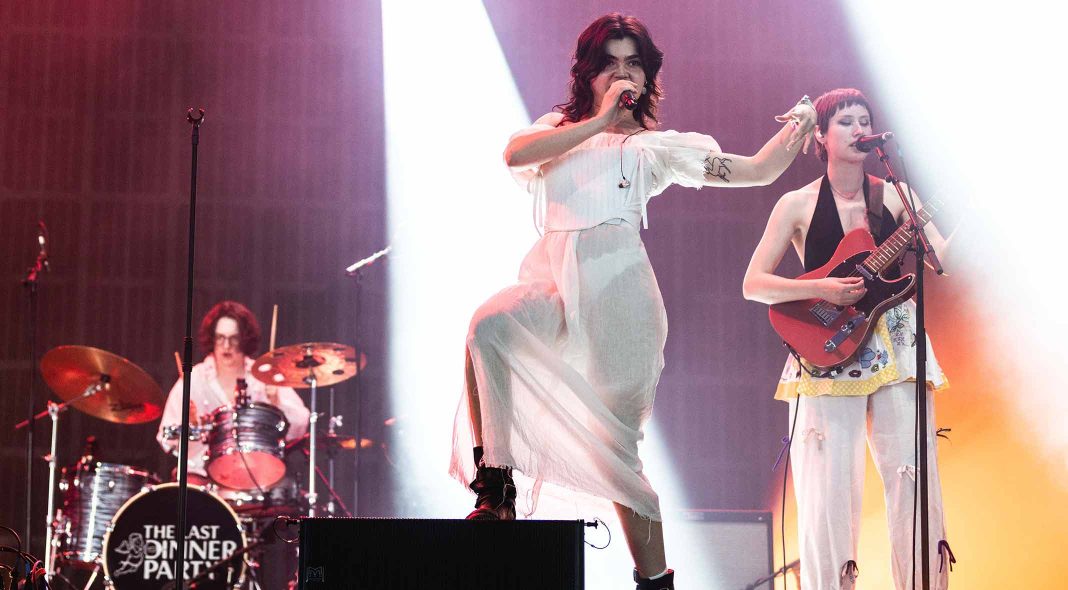Though we are obviously proud of our own cover stories, we share due props and empathy for the team at NME, whose social media accounts went into overdrive last month over their decision to platform Picture Parlour, “the fearless rockers who have become a word-of-mouth sensation a mere six months after their first live gig.”
For a magazine with ‘new music’ in the title, Twitter and Instagram folk seemed surprisingly disgruntled that they were covering just that, not quite understanding that this was a newly-branded push to champion fresh artists rather than a blanket suggestion that Picture Parlour were a ready-built household name. As such, the female-fronted band — like The Last Dinner Party and Wet Leg before them — became social media’s public enemy of the day, a supposed sign of all that is wrong with a music industry that only pushes ‘industry plants’.
With labels and magazines somberly promising in 2020 that things would be different, it’s understanding why indie fans might be galled by the suggestion that this year’s biggest-hyped breakthrough bands are, once again, collections of high-concept, management-backed white girls whose band names initially suggest they may possibly one owned a pony (or at very least, pretended to be one in primary school). The wound stings even harder when even a quick scroll of social media seems to be offering up a litany of black artists revealing massive frustrations with how they’re being treated in early career; Mahalia, Rina Sawayama, Bree Runway and of course, Raye. Logic dictates that for every gushing press slot taken up by a band who already have full industry infrastructure, there is less developmental room for those who are trying their best to do things differently or from a place of less creative mobility. This understandably causes frustration, wondering if we’ll ever get to a place where things are truly judged on musical merit alone.
However, mainstream music journalism outside of DIY zine culture never really worked that way and especially not in the commercial pressures of the digital age. As history has shown, incredible working-class, independent and/or creatively-unique artists will always find ways to make themselves heard, but the music industry, and indeed wider arts and culture, has always swayed notably towards middle-class dominance, meaning that statistically, the majority of breakthrough acts (and the writers who cover them) are going to be people whose parents could afford to expose them to arts and culture or drive them around the country to play shows and take instrument lessons, people whose relative privilege means that they have had the free time to jam with their mates at University and dream up creative ideas instead of working three jobs or caring for younger siblings. It is no coincidence that the wealth of high-profile working-class bands in Britain came from eras where state funding or unemployment benefits were less impenetrable to access, allowing more diverse voices to hone their craft. Without knowing full details, it’s easy to feel bemused at the idea of a band ‘popping up out of nowhere’ to support the Rolling Stones and Lana Del Rey with only two released songs, angrily assuming that they must come from privilege. But if we’re wanting to address class-based bias and unfair access to the arts, governmental systems are the ones to aim our criticisms at, not individual performers.
Of course, good music publications should always be on their own lookout for artists who excite them, right across a spectrum of background, size, independence or genre. The Forty-Five itself was launched to get away from journalism which endlessly praised white men and sidelined both writers and artists of colour or non-male gender identification. But truthfully (and however unfairly) even small or intentionally counter-cultural publications cost money. If a band already has a ‘story’, it becomes much easier to justify their coverage, knowing that there is something there for readers to explore. We’ve become used to judging everything by digital metrics of play counts and TikTok followers, but in the case of both The Last Dinner Party and Picture Parlour, early (unsigned) London gigs served to tactically impress the kind of cultural tastemakers who drive publications, getting influential figures onside early by actively displaying their live talent. Is there privilege in this? Geographically speaking, absolutely. But it only becomes something if the music is actually good.
Both ‘Industry Plant’ and ‘Nepotism Baby’ narratives operate on the idea that having rich parents or an early career support system guarantees success. I’m not out here claiming that artists who don’t have to choose between eating and touring are the hard done by ones in this equation, but it’s important to remember that a ‘free ride’ to the top is rarely that simple, often requiring years of development and potential artistic compromise, ranging from collaborative styling to rigorous PR training. By signing with high-budget management, and exposing themselves to big-gig scrutiny or familial comparison so early on, ‘hype’ bands may choose a lane for themselves that isn’t necessarily as emotionally easy as it looks, requiring a certain kind of fame-welcoming professionalism that a lot of newer artists wouldn’t actually want. Like an actor who chooses a career in indie flicks over Hollywood auditions, there are different ways to measure creative fulfillment, and at times, gushing early press may actually serve to cannibalise a new artist, projecting them to visibility that they aren’t quite ready for.
In some cases, the label of industry plant is simply inaccurate, loaded with tired, rockist connotations of authenticity. Thus far, nobody has been able to specifically point to the exact nepotistic connections or inherited wealth that The Last Dinner Party, Wet Leg or Picture Parlour are meant to have, other than being signed to high-profile management. It therefore feels reasonable to deduce that some of this pushback against them is just good old-fashioned misogyny, uncomfortable with the idea of young women taking up space in guitar music. As journalist Robin Murray put it, Sleaford Mods played a very similar supporting slot to the Who at BST Festival in 2015 to what The Last Dinner Party did with Rolling Stones last year, and nobody was calling them an industry plant. The Last Dinner Party may not be your personal cup of tea, but their baroque-post-punk certainly has editorial intrigue, and their recent set at Glastonbury suggests that they are more than capable of building an enthusiastic audience, dynamically commanding a mid-morning crowd. To lean too heavily on narratives of privilege also serves to patronise audiences, assuming that we won’t be able to see through crap songs. A well-timed take on cottagecore may have sparked early interest in Wet Leg, but their ‘Chaise Lounge’ hype would have fallen off exceptionally quickly if they hadn’t followed it up with a solid debut record and a touring schedule of formidable work ethic.
In our cancel-culture era determination to ‘out’ people’s pasts, we seem uncomfortable with the idea of letting people succeed without comment, even when it risks our own potential embarrassment. When Rhian Teasdale’s ex-boyfriend Doug Richards wrote in The Times last week about his upset at being ousted from the band or not credited on their songs, he may have thought he was doing a Taylor Swift-style exposé of injustice, but all that truly happened was that he came off pretty bitter well after the fact, airing his dirty laundry instead of focusing on growing his own band. There are maybe more nuanced thinkpieces to be had about the difficulties of having a song written about you, but a now-married man banging on about how he wishes his ex-partner had gotten a number four album instead of a number one only serves as petty vendetta, with the paper who published it gleefully leaning into the narrative that any successful female artist must have been hiding her secret male songwriter all along.
If music journalism, as so many people tell us, is dead and irrelevant, then perhaps there is an enjoyable irony in seeing so many get this het up about it. Seemingly, cover stories (or think pieces by exes) do still mean something to audiences. Even those who claim disinterest in the mainstream press obviously want in on it somehow, upset that their version of what is ‘good’ isn’t being reflected. In an era of omnipresent choice and struggling media publications, it should be a joy to see writers and editors bravely look to the future rather than resting on the laurels of what we know already sells, doing our bit to build artists and share stories that can only day help to diversify festival line-ups and democratise the kind of artists who take centre stage. A dedication to intersectional opportunity should always be paramount, but snarkily nitpicking the credentials of new acts before they’ve even really begun to show what they stand for won’t necessarily be the thing to bring more non-white or working-class artists in, or to tackle the myriad structural problems that our industry faces.
In all of this, audiences maybe aren’t as powerless as they might think they are. Away from nepotistic legs-up or whispers of secret streaming societies, the quickest way to get your favourite band into the mainstream press is to make noise about them — to be curious about new music, to back them as a fan and sell out their local shows, to create the kind of ‘buzz’ that editors cannot deny. If the idea of a band having early label support or high-end management will always be a dealbreaker for you, you’re perfectly entitled to your distaste. But when The Last Dinner Party and Picture Parlour head out on tour together this autumn, capitalising on both the hype and the sexist critique, we’ll be watching — and likely, so will you.
Read our review of The Last Dinner Party’s debut album, ‘Prelude To Ecstasy’







